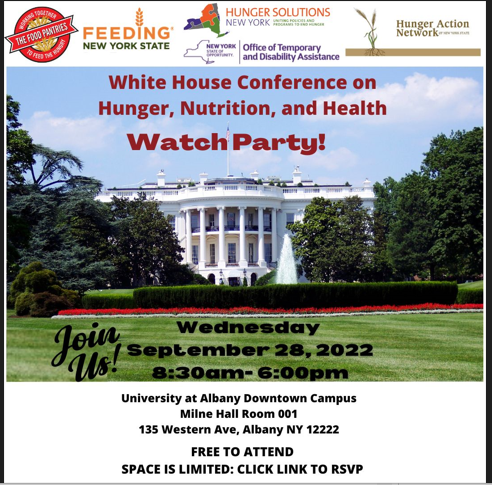
Please join us and our coalition partners at the WH conference WATCH PARTY in Albany on September 28.
Registration is capped at 140, so register now!
The goal:
Millions of Americans are afflicted with food insecurity and diet-related diseases — including heart disease, obesity, and type 2 diabetes — which are some of the leading causes of death and disability in the U.S. The toll of hunger and these diseases is not distributed equally, disproportionately impacting underserved communities, including communities of color, people living in rural areas, people who are differently-abled, older adults, LGBTQI+ people, military families, and military veterans.
Lack of access to healthy, safe, and affordable food, and to safe outdoor spaces, contributes to hunger, diet-related diseases, and health disparities. The COVID-19 pandemic has exacerbated these challenges further.
We cannot wait to act. And we aren’t.
The Biden-Harris Administration will host the White House Conference on Hunger, Nutrition, and Health on September 28, 2022. In parallel to the conference, they will be announcing a National Strategy that identifies steps the government will take and catalyzes the public and private sectors to address the intersections between food, hunger, nutrition, and health.
The five pillars described below define the scope of the White House Conference on Hunger, Nutrition, and Health. They are meant to help identify actions that can be taken by all parts of society — including the federal government; local, state, territory, and Tribal governments; nonprofit and community groups; and private companies.
White House Conference Pillars
- Improve food access and affordability: End hunger by making it easier for everyone — including urban, suburban, rural, and Tribal communities — to access and afford food. For example, expand eligibility for and increase participation in food assistance programs and improve transportation to places where food is available.
- Integrate nutrition and health: Prioritize the role of nutrition and food security in overall health, including disease prevention and management, and ensure that our health care system addresses the nutrition needs of all people.
- Empower all consumers to make and have access to healthy choices: Foster environments that enable all people to easily make informed healthy choices, increase access to healthy food, encourage healthy workplace and school policies, and invest in public messaging and education campaigns that are culturally appropriate and resonate with specific communities.
- Support physical activity for all: Make it easier for people to be more physically active (in part by ensuring that everyone has access to safe places to be active), increase awareness of the benefits of physical activity, and conduct research on and measure physical activity.
- Enhance nutrition and food security research: Improve nutrition metrics, data collection, and research to inform nutrition and food security policy, particularly on issues of equity, access, and disparities.

